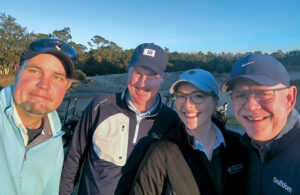A fresh look inside the 2023 Syngenta Business Institute
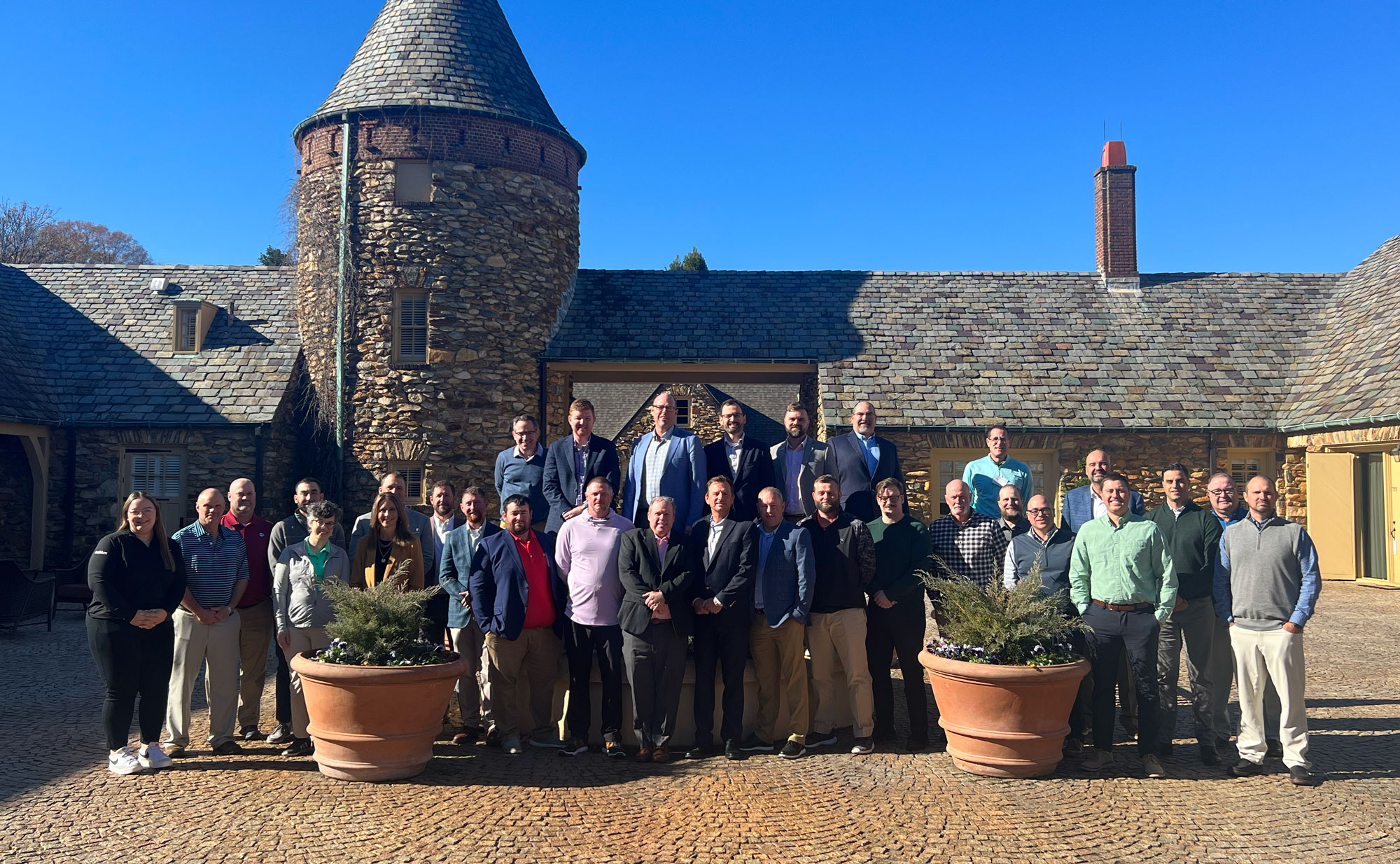
The SBI 2023 attendees. (Photo courtesy of Syngenta)
The 15th annual Syngenta Business Institute (SBI) hit the Graylyn Conference Center in Winston-Salem, N.C. on Dec. 5, with 26 superintendent attendees making the trip to the event.
Since this was my first time attending SBI, I wasn’t sure what to expect, but I can say that it did not disappoint. From the moment I stepped on my connecting flight in Atlanta, I could pick out all the superintendents seated in front of me, not only by their branded quarter zips and blazers but by the instant chatter among the rows. It’s not often that you get a connecting flight in the middle of the afternoon that is full of laughter.
Once we arrived at the Graylyn, with its castle-like exterior, excellent food and service, the conversations continued to flow. Ken Middaugh, faculty director for SBI at Wake Forest University, gave welcoming remarks to the group of superintendents before the mingling began.
Staying organized
On the first morning of SBI, Julie Wayne, Ph.D., professor of management at Wake Forest, started things off with a presentation on how supers can find balance in their lives. Attendees shared how they juggle family, the demands of their occupation and their health. Answers varied, but most wished they had more time for their children.
“Nothing at this job is going to be more important than my family,” Nick Kray, superintendent at Elmcrest Country Club in Cedar Rapids, Iowa, told the room. “If I miss my son’s baseball game and something happens where that’s his last game, I’ll never get that back.”
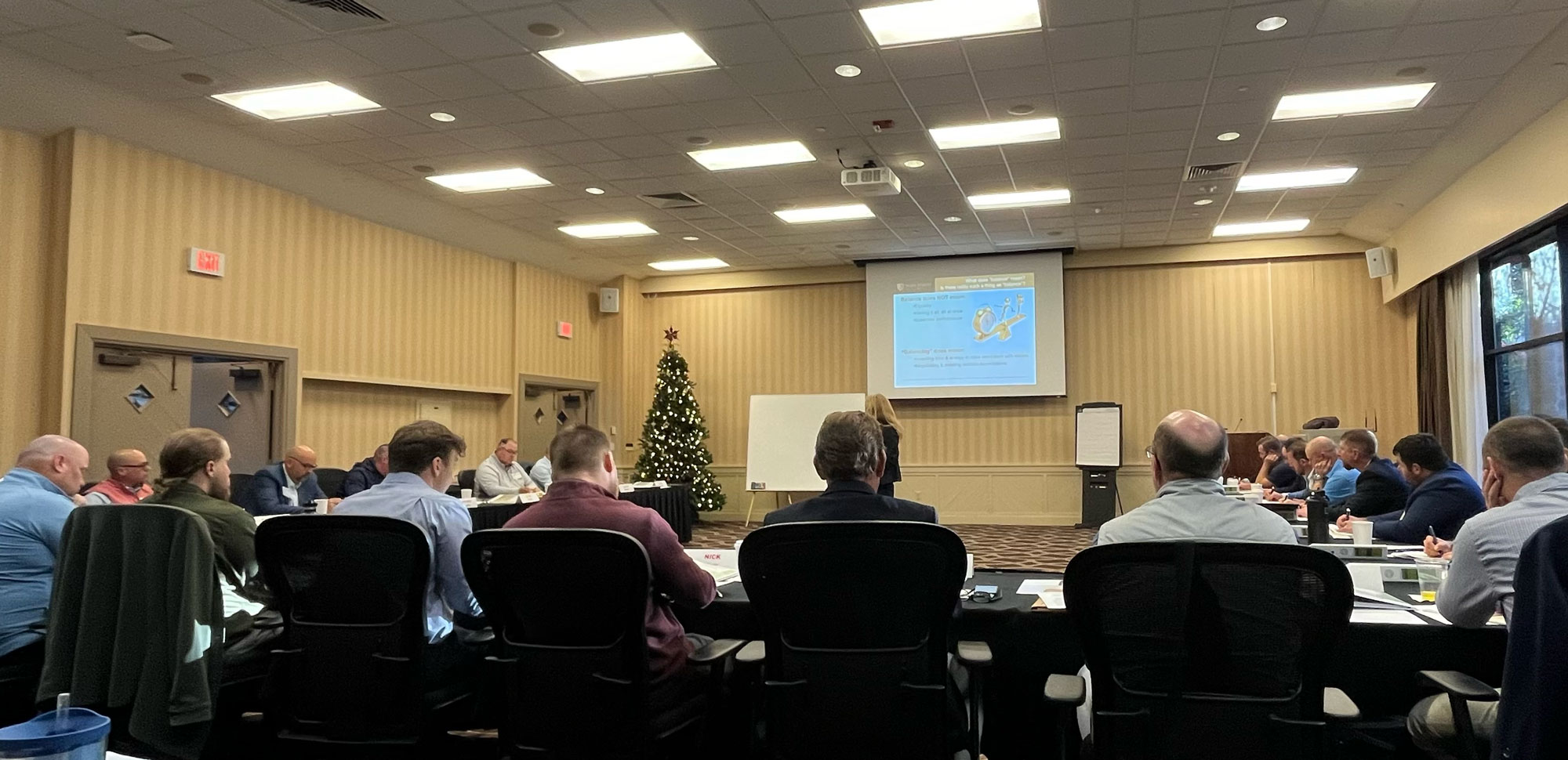
Julie Wayne, Ph.D., professor of management at Wake Forest, shares tips on work-life balance. (Photo: Golfdom staff)
Others shared how they implement a healthy work-life balance.
“I don’t want to be at my course 12 hours a day and I’m not,” Brandon Razo, superintendent at Panther Creek Country Club in Springfield, Ill., and GCSAA’s 2023 Emerging Leader Award recipient, said. “That’s why I’m here — I take time for myself.”

Nick Kray, superintendent at Elmcrest Country Club in Cedar Rapids, Iowa, takes a swing at the golf simulator. (Photo: Golfdom staff)
In the next session, Amy Wallis, Ph.D., professor of practice in organizational behavior, focused on navigating different cultures and generations as a leader. I was able to participate with the supers in Wallis’s activity. I won’t spoil the details, but I will say this: I ran up 20-plus supers in cards and it was the highlight of my week.
The game emphasized the importance of clear communication within your team, especially with language barriers. Once the activity concluded, the conversation shifted to the struggles everyone faces with managing people with different cultural backgrounds and age ranges. Supers bounced ideas off each other and shared advice on what has or hasn’t worked for them.
Hardships ranged from keeping Gen Z staff engaged to how moving courses exposed them to new cultures they found particularly difficult to navigate. Wallis offered solutions, such as implementing games within assigning tasks for younger staff to make work more fun and challenging for them. Wallis closed out her session by encouraging the group to stay in touch.
“Look around the room,” she said. “Everyone here learned what you learned today, but now you’ve got a group of people who you can call on and collaborate with. Growth often comes with collaborating with other people.”
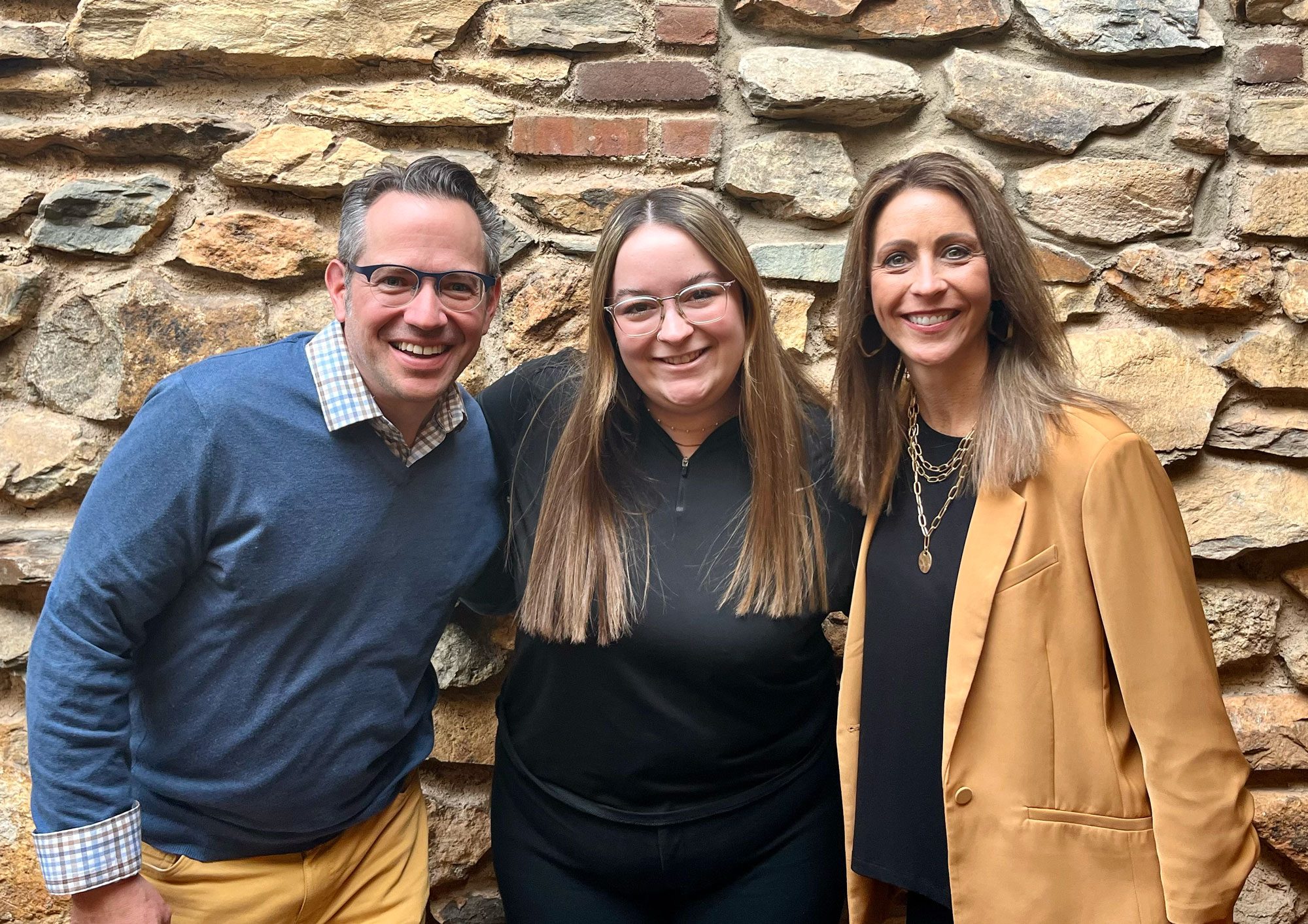
(From left to right) Mark LaFleur, communications lead for turf and landscape at Syngenta, Sydney Fischer, Golfdom digital editor, and Stephanie Schwenke, marketing manager at Sygenta, catch up at SBI. (Photo: Golfdom staff)
Another day of learning
Despite a late night on golf simulators at The Playground Bar, everyone showed up the next morning bright and early at 7 a.m. ready to learn. Sherry Moss, associate dean of MBA programs at Wake Forest, led the first session of the day, which focused on managing individuals and teams.
Moss presented difficult scenarios that superintendents might have already faced or might face in the future and asked how they would handle it. Although this can be uncomfortable, Moss navigated the discussion professionally and catered it directly to the industry.
John Sumanth, associate dean of the MBA program and associate professor of management at Wake Forest, followed up with a more interactive session about negotiating. Sumanth asked the room who was comfortable with negotiating and three hands raised. Others voiced their apprehension about making deals.
“There’s a fear of losing something that might be really good in the end,” Paul Stokes, superintendent at Victory Ranch Golf Club in Heber City, Utah, said. “If you go in too aggressive and the other party isn’t receptive to that, you might lose a good deal.”
In this session, supers took on the roles of a buyer and a seller and practiced their newly learned skills. Sumanth encouraged the group to take the exercise seriously and some went even beyond that. East Coast superintendents, Timothy Zurybida from National Links Trust in Washington, D.C., and Terrance DiLoreto from Crag Burn Golf Club in East Aurora, N.Y., were dubbed the “sharks” of the group for their hard bargains.
Well worth it
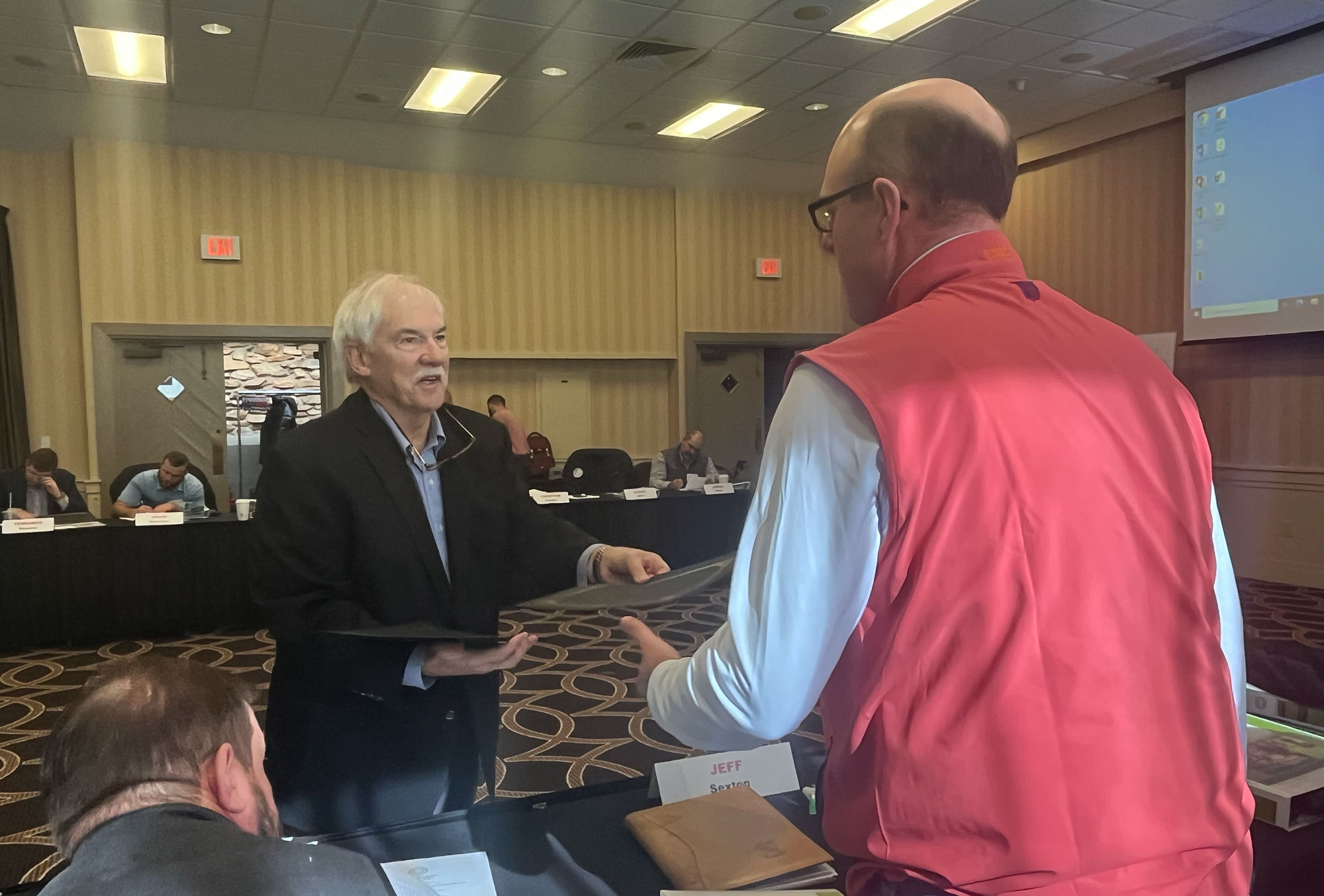
Ken Middaugh, faculty director for SBI at Wake Forest University, presents Jeff Sexton, CGCS, superintendent at Evansville (Ind.) Country Club with his certificate of completion. (Photo: Golfdom staff)
The day concluded with facilitated roundtables where the supers were able to talk about the issues they were experiencing at their courses and receive advice from their peers. The next and final session was another from Moss, where the group learned what kind of leadership style they have and how best to utilize it.
At the end of the conference, each attendee received a certificate of completion, GCSAA credit for continued learning and most importantly: 25 new contacts in their phone.
“I’m almost at a loss for words,” Jeff Lezon, CGCS, superintendent at Canyon Gate Country Club in Las Vegas, Nev., said. “When I get home, I’m going to recommend this to every super I know.”
Razo was another who felt passionate about his experience.
“This has been one of the best educational events that I’ve attended. This whole course provided me with a lot of tools moving forward to not only better myself and better my course, but also allow me to better my crew not only in how they work but in their lives, too,” he said. “If you’re thinking of applying, do it. Even if you don’t feel that you would understand what might be talked about, you’ll definitely have an understanding afterward. And if you have applied before, keep applying. This was my third time applying and it was worth it.”











